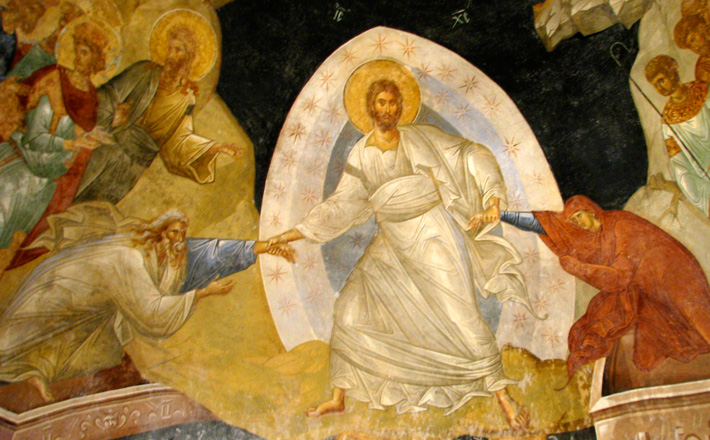Commentary on 2 Thessalonians 2:1-5, 13-17
Paul’s Second letter to the Thessalonians has an interesting history.
While there is certainly debate about its authorship, there are certainly Pauline themes here. Reading through the other texts for this Sunday, there is a heavier theme of death and resurrection; questions about the afterlife. When I read through 2 Thessalonians 2, I get a different feel. This text has more to do with the here and now than the afterlife.
My own practice of lectio divina (divine reading) involves reading through the text first, and choosing one word or phrase to focus and meditate on. The phrase “first fruits” was lifted up for me initially. I was reminded of how wonderfully sweet fresh fruit can be, especially after a long and dreary winter. Perhaps this “sweetness” is exactly what Paul wants us to understand about life here on earth; that even though we may die, we shall live. And, in the meantime, we live under this promise, and life is hopefully not so sour, but rather sweet. Yet, this is not some gnostic “knowing,” but a life of faith, which begins because we were chosen as first fruits by God and given grace as a gift.
Whatever one might believe about how we come to faith, the event of being chosen as first fruits by God is fundamental to the Christian message. In 2 Thessalonians 2:13-14, we find that concept tied not only to the event of the choosing, but also to the breaking in of salvation and the living out of life as God’s chosen. Salvation is so often considered to be a future reality, but there are certainly indicators for the author that this is a present reality. Inasmuch as we are able to understand God’s grace, i.e. the gift of faith, we live differently in a broken world because we have some experience or understanding of salvation.
This section starts by claiming our election as God’s Chosen, then moves quickly to that election’s purpose: salvation. It then proceeds to explain that we receive this salvation through sanctification by the Holy Spirit. This is nothing we have done, but rather is the work of the Spirit. The second result of this election and sanctification is belief in the truth. Verse 14 circles back to the themes of verse 13 quite quickly. We again hear about calling and glory, which, in addition to belief, have come about because of Paul and others’ proclamation of the good news.
How can this text add to your preaching? Given the other texts for this Sunday, the focus from 2 Thessalonians 2 might best come from verses 13-14 with their obvious connection to salvation and resurrection. One theme to highlight could be around the work of the Holy Spirit. Given your tradition, it might work well to talk of the Spirit’s work in and around the proclamation of the Gospel.
The other work of the Spirit from this section is sanctification. For some, hearing the announcement that they have been sanctified, made holy, not by their own works, but by the Spirit could be good news indeed. You might also find it helpful to focus on God’s electing power. All of this could be comforting to people who worry about whether they have done enough as they are reminded of the themes of death and resurrection from the other texts.
The other theme that might be interesting to explore is that of calling and first fruits. In Seminary, our worship professor talked about Pentecost being green because it was the “season of growth.” If God has chosen us as first fruits, and called us through the good news, there may be some room to talk about our callings. While there is much talk and anxiety about death and resurrection, what do we do in the mean-time?
God’s calling to us is not to sit and wait, but rather we are to be comforted by the gospel so that we are “strengthened in every good word and work” 2 Thess. 2. 17. Whatever our situation may be, we are all called as God’s children to be good news for all people. This calling doesn’t stop because we are dying, don’t have time, or are physically unable. And, vital to our own understanding of our vocations, we do not do our callings alone; the Holy Spirit is there, guiding us as we live out all our various vocations.
Finally, there is certainly room to explore the concept of heaven on earth given the nature of this text and its companions. Does Paul believe that even as we are living on earth, we can still experience some sort of salvation? I believe the answer is yes. While heaven on earth may not be what heaven of the Revelation might look like, we can still claim that God has dealt graciously with us, even now.
Assuredly, we live in a broken world, but if we can claim that Christ lived among us, and is with us even still, we can claim that we catch glimpses of salvation in our daily lives. Couple this notion with our sense of calling, and it might make it clearer to see what our mission field is. Might it be easier to see that our own abundance of grace (not possessions!) is God’s gift if we can claim that heaven might have broken into our realities through God’s choice and gift?
After realizing just how sweet life is because of God’s grace, can we try to reach out to others to share that good news and work toward peace and justice? These questions and others might help stir our imaginations about how we are God’s “first fruits.” From here, one can only imagine how wide our mission field might become, knowing that God has chosen us, sanctified us, and sent us out as good news for all people.


November 6, 2016